TU Wien
TU Wien (TUW; German: Technische Universität Wien; still[2] known in English as the Vienna University of Technology from 1975–2014)[3] is one of the major universities in Vienna, Austria.[4] The university has received extensive international and domestic recognition in teaching as well as in research, and it is a highly esteemed partner of innovation-oriented enterprises.[5] It currently has about 28,100 students (29% women), eight faculties and about 5,000 staff members (3,800 academics).
Technische Universität Wien | |
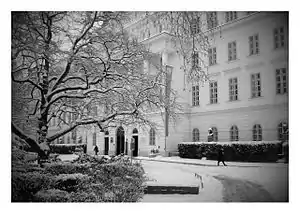 | |
| Motto | Technik für Menschen |
|---|---|
Motto in English | Technology for people |
| Type | Public |
| Established | November 6, 1815 |
| Budget | €271 million (2019)[1] |
| Rector | Sabine Seidler |
Academic staff | 3,830 (2019) [1] |
| Students | 28,149 (2019) [1] |
| Location | , Austria |
| Campus | Urban |
| Website | www.tuwien.at |
 | |
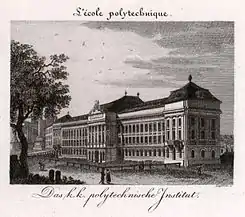
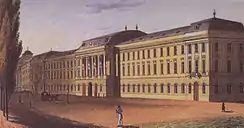
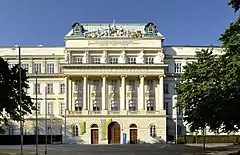
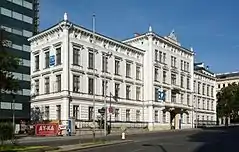
The university's teaching and research is focused on engineering, computer science, and natural sciences. The university's educational offerings have achieved wide international and domestic recognition.[6]
History
The institution was founded in 1815 by Emperor Francis I of Austria as the k.k. Polytechnische Institut (Imperial-Royal Polytechnic Institute). The first rector was Johann Joseph von Prechtl. It was renamed the Technische Hochschule (College of Technology) in 1872. When it began granting doctoral and higher degrees in 1975, it was renamed the Technische Universität Wien (Vienna University of Technology).[3]
Academic reputation
TU Wien is one of the most prestigious universities of technology in the world by presenting a top level of research and education.[7] TU Wien is among the most successful technical universities in Europe and is Austria's largest scientific-technical research and educational institution.[8] As a university of technology, TU Wien covers a wide spectrum of scientific concepts from abstract pure research and the fundamental principles of science to applied technological research and partnership with industry.[9] For 200 years, TU Wien has been a place of research, teaching and learning in the service of progress.[8]
TU Wien is ranked 192nd by the QS World University Ranking as of 2020, and positioned among the best 251-300 higher education institutions globally by the Times Higher Education World University Rankings. Over the years the university has retained a good positioning of their Engineering and Computer Science departments. The later has been consistently ranked among the top 80 computer science departments in the world by the QS World University Ranking[10] and The Times Higher Education World University Rankings[11] respectively. In 2014, U.S. News ranked Computer Science at TU Wien as number 14 in Europe, equaling number 3 within German speaking universities.[12]
| Ranking | 2019 | 2018 | 2017 | 2016 | 2015 | 2014 | 2013 | 2012 |
|---|---|---|---|---|---|---|---|---|
| QS World University Rankings[13] | 199 | 182 | 183 | 197 | 246 | 264 | 274 | |
| QS Faculty Rankings: Engineering & Technology[14] | 127 | 142 | 115 | 93 | 93 | 91 | 132 | - |
| QS Subject Rankings: Mechanical Engineering [15] | 151-200 | 151-200 | 101-150 | 101-150 | 151-200 | 151-200 | 151-200 | - |
| QS Subject Rankings: Electrical Engineering [16] | 101-150 | 101-150 | 101-150 | 101-150 | 101-150 | 51-100 | 51-100 | - |
| QS Subject Rankings: Chemical Engineering [17] | 101-150 | 151-200 | 151-200 | - | 151-200 | - | - | - |
| QS Subject Rankings: Civil & Structural [18] | 101-150 | 101-150 | 101-150 | 101-150 | 101-150 | 101-150 | 101-150 | - |
| QS Subject Rankings: Computer Science [19] | 51-100 | 51-100 | 51-100 | 51-100 | 51-100 | 51-100 | 51-100 | - |
| The Times Higher Education World University Rankings [20] | 251-300 | 251-300 | 251-300 | 226-250 | 226-250 | 251-275 | 301-350 | |
| The Times Higher Education Subject Rankings: Engineering and Technology [21] | 151-175 | 126-150 | 91 | 100 | 96 | - | - | |
| The Times Higher Education Subject Rankings: Computer Science | 76 | |||||||
| Academic Ranking of World Universities (Shanghai Ranking's)[22][23] | 301-400 | 401-500 | 401-500 | 401-500 | 401-500 | 401-500 | 401-500 | |
| Academic Ranking of World Universities, Subject field: Computer Sciences [24][25] | 76-100 | - | - | 101-150 | 76-100 | 76-100 | 101-150 | |
| Academic Ranking of World Universities, Subject field: Electrical Engineering [26] | 101-150 | 76-100 | - | - | - | - | ||
| Academic Ranking of World Universities, Subject field: Materials Science [27] | 151-200 | 101-150 | - | - | - | - | ||
| Academic Ranking of World Universities, Subject field: Mechanical Engineering[28] | - | 101-150 | - | - | - | - | ||
Organization
TU Wien has eight faculties led by deans: Architecture and Planning, Chemistry, Civil Engineering, Computer Sciences, Electrical Engineering and Information Technology, Mathematics and Geoinformation, Mechanical and Industrial Engineering, and Physics.
The University is led by the Rector and four Vice Rectors (responsible for Research, Academic Affairs, Finance as well as Human Resources and Gender). The Senate has 26 members. The University Council, consisting of seven members, acts as a supervisory board.
Research
Development work in almost all areas of technology is encouraged by the interaction between basic research and the different fields of engineering sciences at TU Wien. Also, the framework of cooperative projects with other universities, research institutes and business sector partners is established by the research section of TU Wien. TU Wien has sharpened its research profile by defining competence fields and setting up interdisciplinary collaboration centres, and clearer outlines will be developed.
Research focus points of TU Wien are introduced as computational science and engineering, quantum physics and quantum technologies, materials and matter, information and communication technology and energy and environment.
The EU Research Support (EURS) provides services at TU Wien and informs both researchers and administrative staff in preparing and carrying out EU research projects.
Notable faculty and alumni
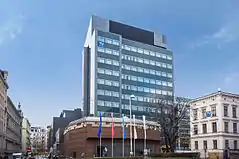


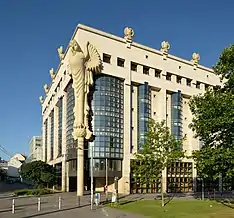
- Siegfried Becher (1806–1873), professor of economics
- Ottó Titusz Bláthy (1860–1939), Hungarian mechanical engineer
- Günter Blöschl (born 1961), Austrian hydrologist
- Silke Bühler-Paschen, professor of physics
- Christian Andreas Doppler, (1803–1853), Austrian mathematician and physicist
- Hugo Ehrlich (1879–1936), Croatian architect
- Paul Eisler (1907–1992), inventor of the printed circuit
- Tillman Gerngross, Professor of Engineering at Dartmouth College, leading entrepreneur and bioengineer, founder of GlycoFi and Adimab
- Ernst Hiesmayr (1920-2006), architect, artist and former rector of the Technical University Vienna
- Marie-Therese Hohenberg, Austrian architect (born 1972)
- Adolph Giesl-Gieslingen (1903–1992), Austrian locomotive designer and engineer
- Karl Gölsdorf (1861–1916), Austrian engineer and locomotive designer
- Edmund Hlawka (1916-2009), Austrian mathematician
- Ingeborg Hochmair (born 1953), electrical engineer, developed the first microelectronic, multi-channel cochlear implant
- Viktor Kaplan (1876–1934), inventor of the Kaplan turbine
- Leon Kellner, grammarian, Shakespearean, and Zionist
- Hermann Knoflacher (born 1940), Austrian engineer
- Benno Mengele (1898–1971), Austrian electrical engineer
- Milutin Milanković (1879–1958), Serbian geophysicist and civil engineer
- Yordan Milanov (1867–1932), one of the leading Bulgarian architects from the end of 19th and the beginning of the 20th century
- Richard von Mises (1883–1953), scientist
- Hubert Petschnigg (1913–1997), architect (completed his studies at TU Graz)
- Ferdinand Piëch (born 1937), Austrian business magnate, engineer and executive who is currently the chairman of the supervisory board of Volkswagen Group
- Franz Pitzinger (1858–1933), Constructor General of the Austrian Navy
- Herman Potočnik (1892–1929), Slovene space pioneer
- Alfred Preis (1911–1993), designer of the USS Arizona Memorial in Pearl Harbor
- Zvonimir Richtmann (1901–1941), Croatian physicist, philosopher, politician and publicist
- Peter Schattschneider (1950), Austrian physicist
- Rudolph Michael Schindler (1887–1953), early Modern architect
- Paul Schneider-Esleben (1915–2005), visiting professor of architecture
- Edo Šen (1877–1949), Croatian architect
- Camillo Sitte (1843-1903), Austrian architect
- Peter Skalicky (born 1941), rector of the Vienna University of Technology from 1991-2011
- Irfan Skiljan, author of the image viewer software Irfanview
- Ignaz Sowinski (1858–1917), architect
- Hellmuth Stachel (born 1942), Austrian mathematician
- Rudolf Steiner (1861-1925), Austrian philosopher and transdisciplinary researcher
- Jörg Streli (1940–2019), Austrian architect
- Gottfried Ungerboeck (1940), inventor of trellis modulation, IBM Fellow
- Milan Vidmar (1885-1962), Slovene electrical engineer
- Ina Wagner (born 1946), Austrian physicist, sociologist, professor of computer science 1987 – 2011, TU's second ever female professor
- Hannspeter Winter (1941-2006), Austrian plasma physicist
- Heinz Zemanek (1920-2014), Austrian computer pioneer

Library
The University Library was founded in 1815. The Main Library building was designed by the architects Justus Dahinden, Reinhard Gieselmann, Alexander Marchart, Roland Moebius & partners. Completed in 1987, it features owl sculptures by the Swiss artist Bruno Weber. The Main Library has six floors of open access areas and reading rooms, with around 700 study desks.
Sports
The University hosted the IFIUS World Interuniversity Games in October 2007.
See also
Notes and references
- "Die TU Wien in Zahlen (The TU Wien in numbers)". Retrieved 6 May 2019.
- "Vienna University of Technology". Top Universities. 2015-07-16. Retrieved 2020-07-09.
- "Corporate Design". Technische Universität Wien. Archived from the original on 2017-10-22. Retrieved 2017-11-28.
- "About TU Wien". www.tuwien.at. 2019-05-08. Retrieved 2019-05-11.
- "TU Wien". Top Universities. Retrieved 2015-11-03.
- "Technische Universität Wien : TEACHING". Retrieved 10 March 2016.
- "Technische Universität Wien : About us". www.tuwien.ac.at. Retrieved 2015-11-03.
- "Technische Universität Wien : TUWIEN Home". Retrieved 10 March 2016.
- "Vienna University of Technology". Archived from the original on 18 November 2015. Retrieved 10 March 2016.
- University Ranking, QS. "Computer Science and Information Systems World University Ranking". Retrieved April 4, 2019.
- Higher Education University Ranking, THE Times. "The Times Higher Education University Ranking by Subject". Retrieved April 8, 2019.
- "Search Top World Universities, p2 - US News Best Global Universities". usnews.com. Retrieved 3 June 2015.
- . Top Universities. Retrieved on 2017-06-11.
- , QS World University Rankings , Faculty Rankings: Engineering & Technology, retrieved on 2017-03-26.
- , QS World University Rankings , Subject Rankings: Mechanical Engineering, retrieved on 2017-03-26.
- , QS World University Rankings , Subject Rankings: Electrical Engineering, retrieved on 2017-03-26.
- , QS World University Rankings , Subject Rankings: Chemical Engineering, retrieved on 2017-03-26.
- , QS World University Rankings , Subject Rankings: Civil & Structural, retrieved on 2017-03-26.
- , QS World University Rankings , Subject Rankings: Computer Science, retrieved on 2017-03-26.
- , The Times Higher Education rankings, retrieved on 2017-04-06.
- , The Times Higher Education rankings, Subject Rankings: Engineering and Technology, retrieved on 2015-05-10.
- , Academic Ranking of World Universities, retrieved on 2015-06-11.
- "Academic Ranking of World Universities 2018". Retrieved April 8, 2019.
- , Academic Ranking of World Universities, Subject field: Computer Sciences, retrieved on 2015-06-11.
- World Universities, Academic Ranking of. "Subject Ranking 2018". Retrieved April 8, 2019.
- , Academic Ranking of World Universities, Subject field: Electrical Engineering , retrieved on 2016-06-22.
- , Academic Ranking of World Universities, Subject field: Materials Science & Engineering, retrieved on 2016-06-22.
- , Academic Ranking of World Universities, Subject field: Mechanical Engineering, retrieved on 2016-06-22.
External links
| Wikimedia Commons has media related to Technische Universität Wien. |
- Official website
- TU Wien on Youtube (English playlist)
- TISS Information System (e.g. links to Publications Database)
- Curricula (fields of study and courses)
- Continuing Education Center – TU Wien (MBA programs, MSc programs, certified)